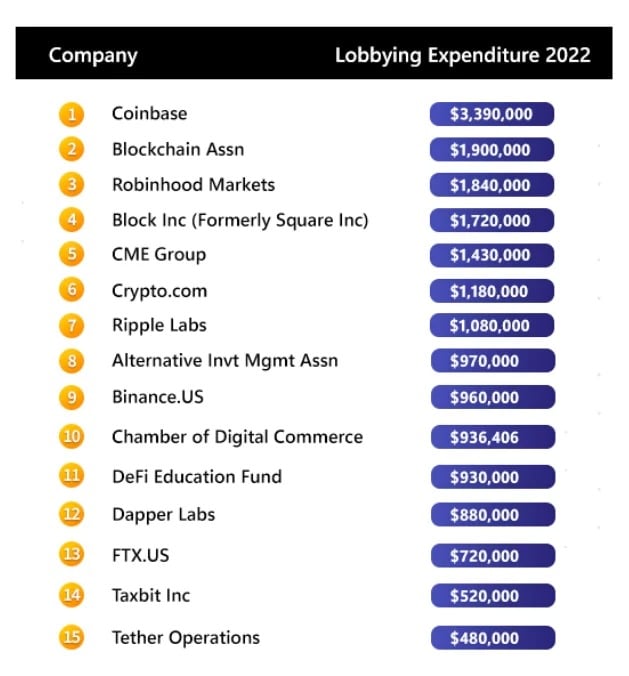US crypto companies have redoubled their efforts to influence policymakers in 2021. In the US, $25 million was spent on lobbying, an increase of 121% over the year. We take a look at this under-explored sector of the ecosystem
Crypto companies have stepped up their lobbying efforts
Controversial in Europe, lobbying is however more common in the US. Local exchange platforms and large companies therefore allocate a sometimes significant portion of their spending to this area. According to a report by The Money Mongers, Coinbase was the company that spent the most on lobbying in 2021. The US giant spent $3.3 million to influence policy decisions in favour of the ecosystem.
Before its fall, FTX was also on track to drastically increase its contributions, with a budget increase that had reached +1340% between 2021 and 2022. It is also noted that Ripple, the XRP issuer, spent over $1 million during 2022.
In total, half of the money spent on lobbying was spent in 2022. This is a reflection of the evolution of the ecosystem… But also certainly a direct consequence of the repeated crises experienced during this year.

Ranking of US companies with the most money spent on lobbying in 2022
We see that the majority of large crypto companies located in the US allocate significant amounts of money to lobbying.
A controversial practice
The Money Mongers report presents the practice of lobbying in a positive light, but it is of course controversial. Some commentators point out that “revolvers”, i.e. decision-makers who choose to leave their jobs to become lobbyists, raise questions of conflict of interest and neutrality.
This is particularly true since we have recently seen a telling example of this porosity. In the wake of the FTX affair, it was learned that nearly 37% of members of the US Congress had received money from the company’s executives. This trend may explain the particularly favourable position of some politicians towards Sam Bankman-Fried, whose parents are members of the US Democratic Party.
On the other side of the issue, there is also a great deal of hostility on the part of regulators – and a great deal of ignorance of the sector – which is sometimes appeased by lobbying efforts. So is it a survival issue for the ecosystem, or is it too controversial to be viable? The question is posed.
